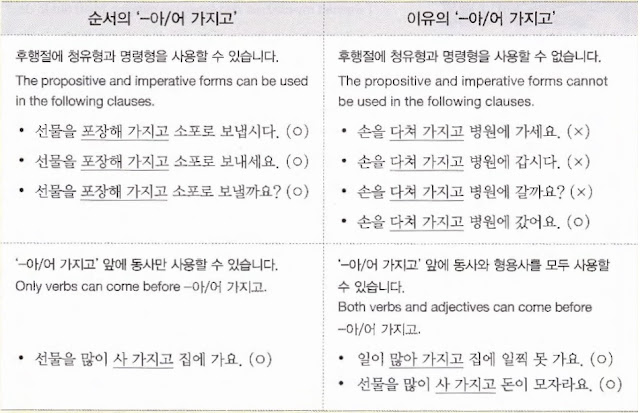가: 이 채소는 어떻게 할까요?
What should we do with these vegetables?
나: 먼저 다듬어 가지고 냉장고에 넣어 주세요. 샐러드는 조금 후에 만들 거 예요.
(First) tidy them up and then put them in the refrigerator. (We’ll) make the salad a bit later.
가: 양강 씨, 지금 뭐 해요?
Yang Gang, what are you up to?
나: 빨래를 해 가지고 널고 있어요.
I washed my clothes, and (now) I’m hanging them out to dry.
This expression indicates the doing of the action in the following clause based on the result of completing the action in the preceding clause. It is often used in conversational speech and is sometimes shortened to -아/어 갖고. Because it indicates the order of two or more actions, this expression can only be used with verbs.
 • 돈을 빨리 모아 가지고 자동차를 사고 싶어요.
• 돈을 빨리 모아 가지고 자동차를 사고 싶어요.
I want to quickly save up some money and (then) buy a car.
• 등산갈 때 계가 집에서 김밥을 만들어 가지고 갈게요.
When we go hiking, I’ll make some gimbap at home and take it along with us.
• 할아버지께서 손자들을 불러 가지고 용돈을 주셨어요.
Grandpa called over all his grandsons and (then) gave them some spending money.
1. This expression is also used to indicate the speaker’s reason for a certain action or state of affairs. In this case, it (this expression) can be used with adjectives.
• 스마트폰을 사고 싶은데 비싸 가지고 못 사겠어요.
I want to buy a smartphone, but (because) they’re expensive, I can’t.
• 지난해에 비해 물가가 많이 올라 가지고 생활비가 많이 들어요.
Compared to last year, the cost of goods has gone up, and (therefore) my cost of living has greatly increased.
However, the form of -아/어 가지고 expresses order, and the form of -아/어 가지고 that expresses a reason is different in the following respects.
 2. This expression can be replaced with the form -아/어서 which indicates the order of actions or events.
2. This expression can be replaced with the form -아/어서 which indicates the order of actions or events.
• 친구에게 책을 빌려 가지고 읽었어요.
= 친구에게 책을 빌려서 읽었어요.
3. This expression cannot be used with the tense expressions -았/었- and -겠-.
• 친구를 만났 가지고 커피를 마셨어요. (X)
친구를 만나겠 가지고 커피를 마셨어요. (X)
->친구를 만나 가지고 커피를 마셨어요. (〇)
>> You can click on the title of each grammar below to learn about the other grammar which also expresses ‘Time and Sequential Behavior’:
01 만에
02 -아/어 가지고
03 -아/어다가
04 -고서
>> Full of Intermediate grammar: Click here

